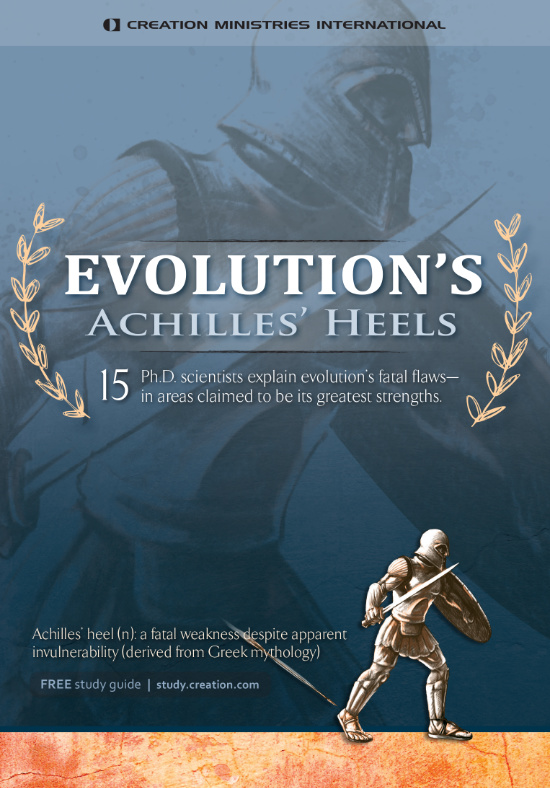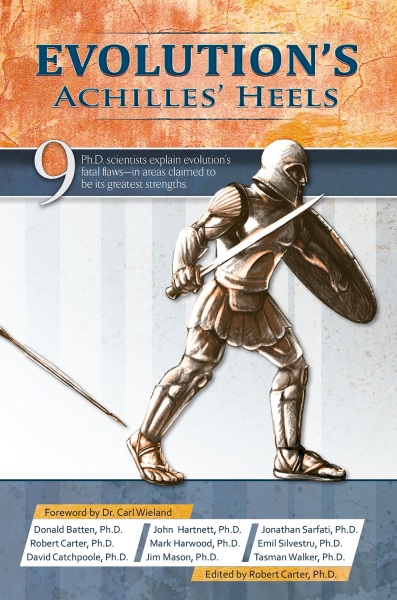Journal of Creation 38(1):118–125, April 2024
Browse our latest digital issue Subscribe
What’s wrong with being wrong: part 7—a more than cursory look into evolutionary ethics (contd)
In part 6, I examined three further arguments employed by evolutionists to explain morality’s and altruism’s origins. These are in addition to the more standard accounts of group selection, kin selection, and reciprocal altruism. This paper surveys another four. Collectively, these ten do not exhaust evolutionary responses. However, they capture the lack of clarity and explanatory power in ethical philosophy and science and their shared inability to give a logical account for morality and goodness.
This paper surveys another four arguments employed by evolutionists to explain the origins of morality and altruism. To help recap the previous articles, table 1 summarizes the evolutionary options and approaches discussed in this series so far.
Sex sells
Darwin wrote:
“There are many other structures and instincts which must have been developed through sexual selection … . It is clear that these characters are the result of sexual and not of ordinary selection, since unarmed, unornamented, or unattractive males would succeed equally well in the battle for life and in leaving a numerous progeny, but for the presence of better endowed males.”1
Hitching his carriage to sex, Darwin’s ‘other theory’, evolutionary psychologist Geoffrey Miller (figure 1) ascribes quasi-panacea qualities to sexual selection, asserting that it can explain the perpetuation of artistic attributes, intelligence, and, most oddly, moral virtues because these traits were sexually attractive. However, there is a rider: Miller denies sexual selection created the virtues. He defends the position they merely built on what our simian ancestors already possessed: “sexual selection amplified our standard social-primate virtues into uniquely elaborated human forms.”2
According to Miller, “sexual selection can ‘supercharge’ other evolutionary processes by adding positive feedback dynamics that tend to trigger evolutionary innovation and speciation.”2 ‘Traditional mechanisms’ involved in social selection, like kin selection and reciprocal altruism, when compared with sexual selection, have limited effect on how they produce and shape the evolution of moral virtues: “Nonsexual forms of social selection can shape morality only insofar as they confer fairly concrete survival benefits (e.g., shared food, protection from predators) on the morally virtuous.”2 However, in combination with, for example, considerations of mate choice, sexual selection will “anticipate, sharpen, and amplify the social selection pressures to produce a more extreme, costly, prosocial version of the moral virtue than social selection could achieve alone.”2
Driscoll offers several valuable criticisms of Miller’s argument, including the all-important: How would moral virtues have spread in a group of non-moral individuals to obtain the “required something to break the non-moral equilibrium that existed in groups before morality arose”?3 She rightly points out that within groups a novel virtuous mutant would be eliminated, eliminated by its ruthless and amoral neighbours. It would require an already virtuous group to safeguard the survival and spread of virtue. This highlights the problem of the non-equilibrium hurdle as it ignores how the group went from zero to virtuous uniformity.
To overcome this, Miller suggests mate preferences for the virtuous. Their attractive character would grant a reproductive advantage. But why would a non-virtuous individual find virtue compelling? After all, not only is the virtuous ‘freak’ less fit, its offspring will be also?
Miller’s answer is that moral virtues telegraph more than probity, having “evolved to advertise individual fitness”.2 Displaying a positive virtue, like empathy, is a reasonable indication of all-round health, what he calls ‘neurogenetic warranty’.4 These sexually selected signals advertise, and are linked to, good genes, which are also indicators of, inter alia, a low ‘mutational load’ (i.e., fewer than average errors in DNA replication),4 and higher intelligence. They are thus a predictor of stable marriages, empathy, exercising, eating well, social, economic, and aesthetic success.5 Despite their cost (e.g., exposing the virtuous individual to cheating and other sociopathic acts), displays of virtue are a guarantee of superior genes for other reproductively valuable characteristics. Acting virtuously communicates that brain, body, and mind are working as a harmonious unit, a combination all too alluring to pass up.
While rejecting the claim that handsome and smart people are necessarily virtuous, Miller ties virtuous behaviour to other attractive qualities:
“… good genes virtues should correlate positively with other well-established fitness indicators, such as physical and mental health, longevity, fertility, body size and symmetry, as well as intelligence … . In particular, genuine phenotypic correlations should exist between good genes virtues, physical attractiveness, social status, and charisma, not just stereotyped ‘halo effects’ in which more physically attractive people are seen as virtuous.”6
Miller seems to be saying what he originally denies; surely ‘attractive’ qualities, such as body symmetry, personality and the like are what makes one person more desirable than another and that these qualities are more than likely found in virtuous persons (figure 2). As Miller himself remonstrates, no-one would accept the shallow assertion that a person is necessarily moral because she is ‘drop-dead gorgeous’; but this correspondence doesn’t want to disappear, because elsewhere he writes:
“… there is an evolutionary deep relationship between moral goodness and aesthetic beauty, as reflected in the overlap between virtue ethics and the recent revival of Darwinian aesthetics … [having its] intellectual roots in late nineteenth-century evolutionary biology, when mate choice for sexual ornaments was seen as the central evolutionary process that creates organic beauty … . Beauty is thus an emergent property of coevolution between a signaling system (the beauty cues displayed by some individuals) and a receiver system (the aesthetic judgment system in other individuals).”7
Miller’s claims are fluid and hard to pin down. He vacillates between one idea and its contradictory. On one hand Miller claims male sociopathic and anti-social personality types have a reduced long-term mating success; yet, in tacit recognition that cheats can, and do, prosper, he gives a free pass to the counterfactual ‘if virtue is good, why do the pathologically dishonest and mean proliferate?’ He claims they, too, are ‘sexy’:
“… there is substantial overlap between sexually attractive personality traits and human moral virtues, but does not pretend that all sexually attractive traits are virtues, or that all virtues are sexually attractive under all conditions. Some individuals may feel most aroused by potential mates who show Machiavellian cunning … or rampant promiscuity … . To argue that some moral virtues evolved through mate choice is not to argue that vice is never attractive.”8
Despite Miller’s special pleading, other studies have argued that a clear genetic evolutionary advantage does accrue to these not-so-nice individuals because of their potential reproductive success through having multiple partners. For example, MacMillan et al. contend that:
“Rather than viewing antisocial personality as maladaptive, it might be considered one end of a continuum of adaptive strategies for maximizing fitness … . We believe antisocial personality disorder describes individuals who have, within the reproductive limits of the human species, chosen [to] maximiz[e their] number of offspring by courting and copulating with multiple mates [thus decreasing time and energy available for protection and provision of relatives, leading to reduced survival of relatives, including offspring].”9
A common weakness in evolution-based explanations is that they are so accommodatingly malleable they cannot be falsified. Closely related to this is that Miller’s thesis has zero predictive value, rendering it worthless to demonstrate any evolutionary history, and it’s between a costly signalling trait and its genetically related phenotypic partner. Responding to Driscoll’s apt objection, Miller comments:
“… signal evolution is highly stochastic … . Sexual selection is a major source of biodiversity precisely because the demands of costly signaling vastly underspecify the precise design details of fitness indicators. Any indicator will do, as long as it is costly, complex, and hard to fake. This is a strength of costly signaling theory because it gives the theory very broad applicability, but it is a weakness because it makes almost impossible any a priori predictions about the design details of indicators in particular species. We can recognise an indicator post hoc when we see one, but we may have never been able to predict which indicators would evolve in which lineages.”10
If we can’t predict any relationship beforehand, there is a logical possibility there is not one. More importantly, any other explanation may be of equal, if not superior, value to Miller’s, including the Christian conclusion of there being no genetic component to ethics and that its origin lies in the immaterial.
Suspect links aside, morality, to Miller, is, again, just another means to an amoral end, not a stand-alone, unique faculty: “moral capacities … [are] costly, conspicuous signals to increase individual reproductive prospects.”11 Evolution struggles to provide justification for moral behaviour being good in and of itself because everything must be referenced back onto reproductive success.12 Nothing novel here.13
Parental manipulation
Theorists argue groups form and persist because there is a reproductive gain for all their members. Alexander argues an exception: situations when altruism between siblings is controlled to further the reproductive interests of the parent(s). Humans, Alexander claims, “are parental manipulators par excellence”.14 He terms this manipulation a type of fraud, though he is at pains to distinguish it from any conscious or purposeful deception by the parent:
“Parental manipulation of progeny refers to parents adjusting or manipulating their parental investment, particularly by reducing the reproduction (inclusive fitness) of certain progeny in the interests of increasing their own inclusive fitness via other offspring … parental care evolves, not because it increases the reproduction of individual offspring, but because it increases the reproduction of the parent.”15
Parental manipulation is an alternative explanation to kin selection. Lauded as an explanation for such diverse phenomena as homosexuality, when parents supposedly transform the child into, and raise him as, a homosexual, certain insects feeding undeveloped eggs to other offspring, cannibalism of the youngest by older aboriginal children during food shortages, polyandrous societies and for “teaching children things like honesty, decency, generosity [because it] driv[es] the children to support the parents’ biological interests”,16 parental manipulation of offspring holds great appeal for evolutionary pundits to make sense of the counterintuitive and biologically inexplicable.
In addition to being devoid of empirical basis,17 the proposal that parents manipulate offspring in order to maximize the former’s fitness, while suppressing the progeny’s, surreally turns any commonsense understanding of altruism on its head. To make sense of this Humpty Dumpty world, one must believe ‘altruism’ has nothing to do with a psychological (or spiritual) unselfish regard for others. It has, however, everything to do with biology and increasing an actor’s reproductive success, even if that (inevitably) entails being at the expense of others’ success.18 Only this fundamental principle makes ‘sense’ of the paradox in Alexander’s following claim: “the entire parent-offspring interaction has evolved because it benefited one of the two individuals—the parent.”19 His explanation runs something like this.
Consider two adult organisms: one possesses a gene enabling it to manipulate one of its offspring to become an altruist with respect to its other offspring, the other adult without it. And suppose—a word with inexhaustible ontological swagger!—this offspring’s aiding its sibling(s) increases the siblings’ reproductive capacity. Combine these two causes, and despite the altruist offspring being effectively sterile, ceteris paribus, “these genes for altruism through parental manipulation will be promoted because [the manipulating organism] is twice as fit, biologically speaking, as [the parent without the manipulating genes].”20
As an explanation to account for increasing progeny’s survival and reproduction, it offers some traction, but as an explanation for altruism’s extending to future generations, it is dead in the water. After all, on the rational assumption the altruistic offspring does not reproduce, how does ‘altruism’ spread if it is found only in the helping offspring?
But what happens if a mutation causes one offspring to manipulate its parent to increase its own reproductive fitness? Alexander proposes two get-out-of-jail cards. If the mutant successfully gains more parental benefits than its siblings, thus lowering the parent’s fitness, not only will this increase his fitness, but his offspring will carry the manipulative allele in greater numbers. However, once it is an adult, its own inclusive fitness will be reduced because its offspring will be more manipulative than he: “no individual can receive a net benefit from possessing such an allele, and genetic lines will win that lack alleles disrupting in this fashion the parent-offspring interaction.”19
Second, with a few caveats, by withholding parental care or punishing (or even eliminating!) the manipulative offspring, the parent sees a net reproductive gain. Benefit accrues only if: (i) the negative effects incurred by the other offspring act against the manipulative offspring; (ii) it is combined with the cost of energy and decrease to the parent’s fitness controlling the same manipulative offspring; and (iii) it does not exceed what would have been the detrimental consequences upon the parent if no action had been taken against the offspring’s adversarial behaviour. Furthermore, if cheating (and, if I correctly understand Alexander, this entails, for example, deceit by the mutant offspring toward its parent and sibling) by the mutant is trivial, “individual offspring should evolve to allow” the parent to always win because the negative cost to the mutant (maximally death at the hands of the parent), resulting from detrimental action taken against its parent, will eclipse any gain to its inclusive fitness.21
Compulsion
The imposition of force on the weak by the strong other is perhaps the most counter-intuitive of evolutionists’ explanations for altruism’s existence. However, given the redefining of altruism as nothing more than reproductive success, cases such as a male chimpanzee’s aggressive demand for meat from a subordinate or forcing an impala to the edge of a herd to act as a sentry, causing it to be more alert for its own safety as well, can all be squeezed under the rubric of biological altruism.
Non-adaptive altruism-beneficial acts forced onto an ‘altruist’ by unrelated companions, such as slave ants working for their masters (figure 3), are regarded as examples of biological altruism because the reproductive capacity of the imposer increases at the expense of the ‘altruistic’ provider.22
There are two other explanations on offer. If a punisher of a cheat does not subsequently interact with that individual, and the defector, as a result, switches to cooperation with others, this comes at a cost to the punisher and therefore is regarded as an act of altruism. In other words, the punisher has put himself at risk by being the ‘cop on the block’ to enforce community rules and expectations but his efforts have turned into a loss.
A second narrative accounts for a ‘variety’ of altruism by having the punisher subsequently interact with the cheat, gaining a benefit after this punishment through the community perceiving him as unselfish because he has risked everything for them. However, he collects the unwelcome reputation as an enforcer, always on the alert for rulebreakers.23
Reason
According to animal rights activist and Princeton academic Peter Singer (figure 4), it is the evolutionary acquisition of reason which underlies morality impartiality. Reason, he argues, can explain the emergence of psychological altruism. Reason’s objectivity, in not allowing self-interest to count more than another’s, enabled true altruism to appear:
“Nor … is it irrational for people to prefer their own interests and those of their families to the interests of strangers. Yet it remains true that there is no magic in the pronoun ‘my’ which gives greater intrinsic importance to my interests, or those of my father, relatives, friends, or neighbours. Hence when I ask myself what it would really be best for me to do—best not in terms of my own interests and desires, but best from an objective point of view—the answer must be that I ought to do what is in the interests of all, impartially considered.”24
Without reason, non-reciprocated acts of kindness put individuals at a disadvantage. Reason would be selection advantage:
“… if the capacity for reasoning brings with it an appreciation of the reasons for extending to strangers the concern we feel for our kin and our friends, evolution would not eliminate this rational appreciation of the basis of ethics … . The evolutionary advantages of the capacity to reason would outweigh the disadvantages of occasional actions which benefit strangers at some cost to oneself.”25
Is Singer being disingenuous or has he missed the epistemological problem? Singer’s intention is clear: he wants to present a deductive syllogism (after all, empirical verification is impossible) in which objective reason adjudicates, leading to the conclusion that a person must act disinterestedly with respect to weighing his own and others’ needs. But has Singer successfully prosecuted his case?
At best, it is a triviality; at worst, it is a circular argument as he has said nothing more than what is already in his initial premise. To claim that self-interest should not trump another’s is what it means to be impartial. This makes evident his question begging that there is no genuine intrinsic importance to my desires over and above any other’s. Shouldn’t Singer initially provide a reason why everyone’s rights are to be equally considered rather than assuming it? Isn’t the ethical egoist or hedonist26 equally entitled to point out that her wants are more important than anyone else’s because of the very fact that they are hers? After all, ceteris paribus and reason notwithstanding, according to evolutionary orthodoxy, nature’s genealogy is one ‘red in tooth and claw’.
In any case, people serially ignore reason’s rule. Singer’s explanation, just one of multiple evolutionary narratives, is that feelings controlling actions arose before reason appeared. An internal struggle between younger reason and older passion now grips the human psyche, with people often opting for action that takes no account of others’ needs or interests.27 The ancients understood this failure of the intellect and conscience as akrasia;28 we moderns, as cognitive dissonance. Singer’s ivory tower idealism glosses over this counterfactual by special pleading: “most of us have too much natural sympathy for others, and too many emotional ties with our community, to take this course.”29 This is hardly a formidable ethical defeater of the egoistical who may regard these ‘ties’ as an instrumental means to their own self-interested ends!
And in a very strange, almost Machiavellian, twist, Singer virtually commits himself to the position of which he is so vocally disdainful. While there was once an evolutionary advantage to seeking our own happiness, reason defeated self-indulgence by finding meaning in the ethical life and concern for others’ interests. It is odd that the ultimate justification for seeking the well-being of others was humans realizing that self-interest resulted in “boredom and loss of interest in life”.30 Seeking another’s happiness only because it results in a more interesting and meaningful life, goals of self-gratification, is hardly self-denying altruism.
At the end of his seminal best seller, Singer asks the only important question: “Why act morally?” A convincing response, you would think, should epistemically attract an ethical answer; but this just doesn’t happen: “It is not a question within ethics, but a question about ethics.” In its place comes the non-moral, universalizability: “Taking ethics as in some sense necessarily involving a universal point of view seems to me a more natural and less confusing way of discussing these issues.”31
Laying your own concerns aside and constructing judgments from a disinterested spectator’s vantage is the key component of morality for Singer.32 But this summons a further relevant demand: “Why should ethics be universalizable?” In one sense it would seem there is no ready answer. After all, to whom or what is an appeal for information made within an evolutionary worldview? For Singer there is no warrant: the reason one must appeal to universalization of anything ethical is that it just is the (rational) case that such must be appealed to. This seems to be a claim to bruteness, that universalization just is, in no need of further grounding.
No one, as far as my understanding of Singer’s atheism goes, can reasonably indict him for inconsistency. His rejection of God entails the embrace of a surrogate to explain existence; and Singer quite predictably adopts evolution and its philosophical bed-fellow, metaphysical naturalism, as God’s subrogation. Trading the transcendent personal for the subaltern and immanent impersonal comes at great cost:
“When we reject belief in a god, we must give up the idea that life on this planet has some preordained meaning. Life as a whole has no meaning. Life began, as the best available theories tell us, in a chance combination of molecules; it then evolved through random mutations and natural selection. All this just happened; it did not happen for any overall purpose.”33
By asking us to take our own viewpoint “to a standpoint like that of the impartial spectator”,34 an inescapable problem surfaces. In a naturalistic, evolutionary world, his ‘friend’ who subs for the Creator is a figment of atheist wishful thinking: the atheist cosmos does not speak. And this hitch rudely surfaces when Singer accepts that an egoistic rational agent, one who subscribes to the maxim ‘Let everyone do what is in my interests’, is rationally entitled to cheat the other to obtain his ends. Singer can’t appeal to any moral proscription because such objectivity is non-existent.
After almost 300 pages of argument for reason serving as the key to an ethical life, Singer concludes with the anticlimactic:
“It cannot be proven that we are all rationally required to reduce pain and suffering and make the world a better place for others … . We will probably always need the sanctions of the law and social pressure to provide additional reasons against serious violations of ethical standards.”35
Out of what would seem desperation, Singer opts for a society run by rules which take into account both our selfish nature, as inherited from the evolutionary past, and a utilitarian greater good decided by a quasi-mystical impartial point of view. A rule-based ethics, however, has no infrangible absolutes, as Singer concedes, and thus can be abandoned whenever the situation demands. Why this can be done is that we are social creatures and must make concessions to the majority or some principles that “are no more than relics from our evolutionary and cultural history and can be discarded without cost.”36
Conclusion
I have examined four additional accounts for the rise of morality and altruism. All share an appeal to just-so stories which lend a façade of intellectual credence to the explanation. Related to this is the failure to solve the problem of altruism and goodness being reproductively disadvantageous to any individual in whom these characteristics first appear. As many evolutionists have noted, being unethical can pay dividends: cheats can, and do, prosper.
As with part 6’s three explanations, there is an elusive (and illusory) genetic piece to the puzzle. The necessary empirical verification is missing. In its place is the assumption that evolution has caused the moral gene(s) to arise because we would not be moral creatures if evolution had not caused this. This is a spectacular example of question begging.
Again, creationists are encouraged to underscore the lack of scientific and historical data in ethical philosophy and use this vacuum as an apologetic against the evolutionary worldview.
In the following papers I will review evolutionary arguments for metaethics, a subdivision of ethics. Simply put, metaethics asks what is going on in ethical discourse. In addition, I will unpack several contemporary ethical philosophers’ attempts to vindicate a metaethics grounded on evolution.
I would like to thank two anonymous reviewers for their suggestions. I also wish to thank David Green for his input.
References and notes
- Darwin, C., The Descent of Man, and Selection in Relation to Sex, Penguin Books, p. 243ff, 2004 (1879, 2nd edn). As an aside, Darwin, in what appears to be a ‘scientific’ justification for marrying his first cousin Emma, wrote in the concluding passages to his Descent: “Both sexes ought to refrain from marriage if in any marked degree inferior in body or mind; but such hopes are Utopian and will never be even partially realised until the laws of inheritance are thoroughly known … . When the principles of breeding and of inheritance are better understood, we shall not hear ignorant members of our legislature rejecting with scorn a plan for ascertaining by an easy method whether or not consanguineous marriages are injurious to man” (p. 688). Darwin’s jibe against the politicians would seem to be a less than disguised attack on Christianity’s proscription against incest. Return to text.
- Miller, G., Sexual Selection for Moral Virtues, The Quarterly Review of Biology 82(2):97–125, 2007; p. 98. Return to text.
- Driscoll, C., Why moral virtues ate probably not sexual adaptations; in: Sinnott- Armstrong, W. (Ed.), Moral Psychology, vol.1; The Evolution of Morality: Adaptations and innateness, The MIT Press, Cambridge, MA, p. 246, 2008. Return to text.
- Miller, ref. 2, p. 101. Return to text.
- Miller, ref. 2, p. 108. On the other hand, lower intelligence, having an underlying genetic dimension, is a predictor of “murder, rape, assault, alcoholism, drug addiction, absenteeism, child abuse and neglect, passing along sexually transmissible infections, and causing fatal traffic accidents” (p. 108). Return to text.
- Miller, ref. 2, p. 113. Return to text.
- Miller, G., Kindness, fidelity, and other sexually selected virtues; in: Sinnott- Armstrong, ref. 3, p. 232. As Christians, we argue that beauty in the creation is a result of God being beautiful. For pagans, as demonstrated by Miller’s propositions, the creation itself must engender it. Of course, this raises many philosophical problems, especially when the evolutionary spin rules. Very little, if anything at all, has been written on this subject of beauty in Christian thought and how evolution cannot explain what it is. Why is beauty beautiful? Return to text.
- Miller, ref. 2, p. 99. In an energetic bout of anthropomorphic depiction, according to Miller even “animals often have incentives to lie about their own qualities to attract more mates” because “Most animal communication is relentlessly narcissistic” (p. 100). Return to text.
- MacMillan, J. and Kofoed, L., Sociobiology and antisocial personality: an alternative perspective, J. Nervous and Mental Disease 172(12):701–706,1984; pp. 701, 702. A ‘random’ maximizing of your reproductive fitness has long been given the ‘moral’ thumbs-up through sperm donor banks. There are multiple reports of men who, for egoistic calculations, ‘fathered’ 100’s, if not 1,000’s of children. See, for example, Sperm donor alleged to have fathered 550 children faces legal action, accessed 3 Jul 2023; and Ari Nagel, accessed 3 Jul 2023. I explore the world of the psychopath, and the plethora of evolutionary explanation associated with it, in far more detail in a subsequent paper. For now, the alacrity exhibited by supporters for the genetic and biochemical basis for sociopathy and the like is unwarranted. Return to text.
- Miller, G., Response to comments; in: Sinnott-Armstrong, ref. 3, p. 265. I have a sneaking suspicion the post hoc, ergo propter hoc fallacy is also rearing its ugly head here! Return to text.
- Sinnott-Armstrong, ref. 3, p. 211. Return to text.
- While not on board with Miller’s enthusiastic support for sexual selection of the virtues, Driscoll nevertheless concedes that preferences for moral mates “involve simple self-interest” (Sinnott-Armstrong, ref. 3, p. 250). Return to text.
- There is a more disturbing footnote to Miller’s argument that virtues are a good gene indicator. Miller endorses the work of Arthur Jensen and J. Philippe Rushton. Up to their deaths, these two psychologists promoted the very dangerous idea that the difference in IQ scores between black and white American could be substantially put down to genetics. In a 2008 article, they wrote: “Despite repeated claims to the contrary, there has been no narrowing of the 15- to 18-point average IQ difference between Blacks and Whites (1.1 standard deviations). The differences are as large today as when first measured nearly 100 years ago. Racial group differences, and the associated gaps in living standards, education levels, etc., are rooted in factors that are largely heritable, not cultural” (Rushton, J.P. and Jensen, A., James Watson’s most inconvenient truth: race realism and the moralistic fallacy, Medical Hypotheses 71(5):638, 2008). Both supported a eugenics program.Another problem for Miller is his dependence on twin studies. (It was Darwin’s cousin, the eugenicist Francis Galton, who initiated twin research in the 19th century.) While a full examination is impossible in an endnote (it would require, minimally, a separate paper), twin studies received an exhaustive and highly critical exposé in Joseph, J., The Trouble with Twin Studies: A reassessment of twin research in the social and behavioral sciences, Routledge, New York, 2015. What can only be described as scandalous, all twin studies which pushed a genetic causation for behaviour are riddled with methodological errors, including consciously tendentious ones. These include, but are not limited to: (i). lack of control groups (ii). assuming separated monozygotic twins had been truly separated when in fact they were not and had had contact and shared a common cultural, and often a geographic, environment (iii). late separation (iv). the lack of reliability and validity of the characteristic under study, (v). bias in favour of a genetic interpretation (vi). subject recruitment done through media which produced a biased sampling due to the twins having to have known each other to respond, thus excluding twins who truly had had no contact (vii). subjects given expensive gifts to participate (viii). twins lying and comparing notes (ix). twins adopted by different branches of the same family (x). drawing conclusions from an extremely limited sample size (xi). question begging the genetic explanation for the similarities (xii). investigator fraud (xiii). data not being made available to examine (xiv). questionable statistical practices, including upward adjustments, and (xv). subjects chosen because they were so alike. Return to text.
- Alexander, R.D., The evolution of social behaviour, Annual Review of Ecology and Systematics 5:367, 1974. Return to text.
- Alexander, ref. 14, p. 337. Return to text.
- Ruse, M., Sociobiology: Sense or nonsense? D. Reidel Publishing Company, Dordrecht, Holland, pp. 63,67–69, 1985. As an explanation for homosexuality, see Kirby, J., A new group-selection model for the evolution of homosexuality, Biology and Philosophy 18(3):689–690, 2003. Return to text.
- Alexander admits that actually measuring fitness shifts is extremely problematic. He writes, “This problem could scarcely be pointed up better than by the difficulty in deciding whether a particular aspect of human culture is increasing or decreasing the reproduction of its bearers” (Alexander, ref. 14, p. 374). Return to text.
- For further explanation on this division, see Kay, M., What’s wrong with being wrong: a closer look at evolutionary ethics—part 1, J. Creation 36(2):116, 2022. Return to text.
- Alexander, ref. 14, p. 340. Return to text.
- Ruse, M., Sociobiology: a philosophical analysis; in: Caplan, A.L. (Ed.), The Sociobiology Debate: Readings on the ethical and scientific issues concerning sociobiology, Harper & Row, New York, p. 359, 1978. Return to text.
- Alexander, ref. 14, pp. 340, 342. Dawkins has contested Alexander’s contention that parents must always win in conflicts with their offspring. Whether Dawkins’ rebuttal is successful remains an open question. After all, both he and Alexander depend on arcane entities, namely, gene(s) for altruistic and selfish behaviour, the one essential item which seems to have been given a free ontological pass. However, as I read it, Dawkins ‘strawmans’ Alexander’s premise. The latter proposes the offspring possesses a newly fashioned mutant gene not inherited from the parent and which gives it an advantage over its siblings (and the parent) while Dawkins alters the terms: “The fact that Alexander is considering a newly mutated gene is not fundamental to the argument. It is better to think of a rare gene inherited [my italics] from one of the parents.” See Dawkins, R., The Selfish Gene, Oxford University Press, Oxford, pp. 135ff, 2006. As an aside, much of Dawkins’ rebuttal suffers from his belief that the individual gene is all that matters, when it is the entire 23/46 chromosome makeup which is inherited, warts and all, not a single gene. Bertram is also adamant Alexander’s case is invalid, despite conceding “parents may often be able to manipulate their offspring in practice in such a way as to compel them to be more altruistic than those offspring would otherwise be [for example,] if a mother is able to partially castrate some of her offspring, they are in effect compelled to be altruistic toward their kin as their only way of reproducing.” Bertram, B.C.R., Problems with altruism; in: King’s College Sociobiology Group (Ed.), Current Problems in Sociobiology, Cambridge University Press, Cambridge, p. 260, 1982. Return to text.
- For more examples, see Bertram, ref. 21, pp. 259–261. Return to text.
- For elaboration on the mechanics, so-called, see Stevens, J.R., The selfish nature of generosity: harassment and food sharing in primates, Proceedings: Biological Sciences 271(1538):451–457, 2004. Somewhat in opposition to this is a bizarre experiment in which subjects’ brains are scanned to see what was occurring when they punished defectors in a game of economic exchange. The authors concluded from the produced images that “Altruistic punishment is probably a key element in explaining the unprecedented level of cooperation in human societies [due to] altruistic punishment provid[ing] relief or satisfaction to the punisher and activat[ing] … reward-related brain regions” (de Quervain, D., Fischbacher, U., Treyer, V., Schellhammer, M., Schnyder, U., Buck, A. and Fehr, E., The Neural basis of altruistic punishment, Science, New Series 305(5688):1258, 2004). It needs be pointed out that this form of altruism is not the psychological variety but the reinterpreted biological type. After all, how could this be genuine altruism if someone obtains personal gratification? Return to text.
- Singer, P., The Expanding Circle: Ethics, evolution, and moral progress, Princeton University Press, Princeton, p. 153, 2011. Return to text.
- Singer, ref. 24, pp. 139–140. Singer is not alone in his apotheosis of reason as the basis of morality. Kant pressed reason to this end. Kant quickly becomes turbid and unreadable, so for a bitesize, digestible analysis of his Fundamental Principles of the Metaphysics of Morals, in Lindsay, A.D., Kant, Oxford University Press, London, pp. 162ff, 1936. Return to text.
- One definition of ethical egoism is “each person has a moral duty to follow those, and only those, moral rules that will be in the agent’s maximal self-interest over the long haul” (Craig, W.L. and Moreland, J.P., Philosophical Foundations for a Christian Worldview, IVP, Downers Grove, Il, p. 426, 2003). Ethical hedonism is the principle that pleasure is the highest good. Return to text.
- Perhaps the most salient example of this is abortion. No matter what ‘justification’ a person may proffer for the pro-death argument, ultimately it comes down to the mother’s interests at the expense of the child’s. Return to text.
- The original extended discussion of this occurs in Book 7 of Aristotle’s Nicomachean Ethics. However, the Apostle Paul eloquently and succinctly—in opposition to Aristotle’s prolixity—notes the psychological phenomenon: “My own behaviour baffles me. For I find myself not doing what I really want to do but doing what I really loathe … . I often find that I have the will to do good, but not the power. That is, I don’t accomplish the good I set out to do, and the evil I don’t really want to do I find I am always doing” (Romans 7). The pagan Greek had no solution to this ‘wretched’ state; but Paul did: “Who will deliver me from this body of death? I thank God there is a way out through Jesus Christ our Lord.” (Romans 7:24–25) Return to text.
- Singer, ref. 24, p. 145. Return to text.
- Singer, ref. 24, p. 146. Return to text.
- Singer, P., Practical Ethics, Cambridge University Press, Cambridge, p. 277, 2011. Return to text.
- Kant was probably the most famous proponent of the truth of reason, leading to his categorical imperative, or the universality of moral prescriptions: “Act only in accordance with that maxim through which you can at the same time will that it become a universal law” (Kant. I., Groundwork of the Metaphysics of Morals, Cambridge University Press, Cambridge, p. 31, 2006 (1785)). Return to text.
- Singer, ref. 31, p. 291. Return to text.
- Singer, ref. 31, p. 279. Return to text.
- Singer, ref. 31, p. 295. Return to text.
- Singer, ref. 31, p. 167. Return to text.










Readers’ comments
Comments are automatically closed 14 days after publication.